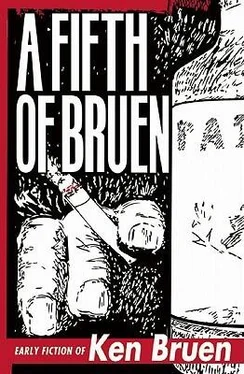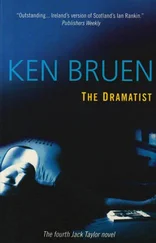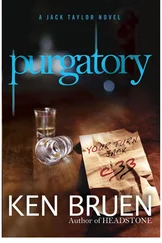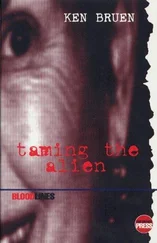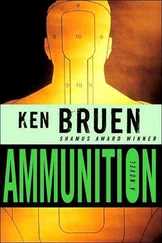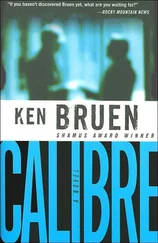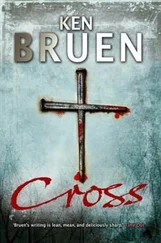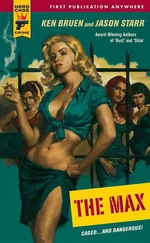Ken Bruen
A Fifth of Bruen: Early Fiction of Ken Bruen

Origins of an Original
By Allan Guthrie
Imagine, if you will, the time before Jack Taylor, the time before Brant & Roberts, the time before Serpent’s Tail published Rilke In Black and Her Last Call To Louis MacNeice . Picture a bar in the west of Ireland. It’s evening. Smoke hangs thick in the air. Laughter bounces from table to table. It’s the Galway Arms Bar, and there’s the young Ken Bruen, smiling and joking as he hands over a copy of his latest book to a brand new reader. That reader was one of the lucky ones.
Ken Bruen’s early works have been much sought after in the last few years, and they’ve been virtually impossible to obtain.
Until now.
You have in your hand, A Fifth Of Bruen , an omnibus edition of those early works, four short novels and two collections of short stories which Ken Bruen used to sell by hand in the bars of his home town.
The first of the novels to be published was Funeral: Tales of Irish Morbidities . Published by Terrance Publishing in 1991, it tells the story of a young Irishman who is fascinated by funerals. So much so, that his life is spent frequenting one funeral after another. What’s intriguing about this novel is that, as with most of Bruen’s very early work, it isn’t a crime novel. Oh, there are crimes, sure, but it’s a literary novel, no question. Highly contemplative, introspective, but even then, I’m glad to say, Bruen didn’t “do scenery”, and the plot has a pace to it that’s often frequently absent from the typical literary novel. And, of course, it’s full of Galway humour.
In Funeral we find the following appearing in (to borrow a Bruen phrase) jig time:
America
Books
Irishness
Alcoholism
Fathers
Poetry
Quotes
And of course:
Lists
Bruen aficionados will recognize in the above list some of the obsessions which have gone on to drive many of his subsequent novels, creating the idiosyncrasies which make the Bruen novel stand out from the crowd, and make his books horribly imitative for us, his poor colleagues. Bruen is the one writer it’s not recommended to read if you’re writing a novel yourself. His style is so easy, fast-paced, elegant, it’s hard not to find yourself emulating it.
Shades Of Grace , published in 1993, is a love story, but of the sort that only Ken Bruen could write. The central character is, like many Bruen protagonists, a literary-named figure: Ford (after Ford Madox Ford), a social worker who should really have a social worker of his own. Ford is an Irishman abroad (London), who falls in love with an American, Grace (Bruen temporarily amalgamates the two countries with his use of the acronym, CIA, to mean Catholic Irish Alcoholic). Yes, Ford has a drink problem. So much so that a client tells him, “You drink and you drink and you fall over every time I see you.”
This novel has some terrific observations, from the anti-authoritarian “The police arrived about midday. In plain clothes, they had that politeness that slaps your face,” to the more general aphoristic rhetorical wit of “How dangerous could someone called Cecil be?” Bruen wasn’t writing noir yet, but Ford bears many of the hallmarks of a noir protagonist.
Martyrs , originally published in 1994, has more emphasis on plot, more twists, more surprises, more suspense. But without sacrificing any characterization. It’s here that Bruen first quotes a crime novel, the protagonist, Stephen Beck, saying, “If you had to quote a writer, make it a crime writer”. Beck is a loser. He has a degree in sociology, runs a market stall, has “an ex-wife, an ex-child, and no excuses.” And his alcoholic brother is in a hospital for the “dipstick dysfunctional.”
Even back in 1994, Bruen was giving mothers a hard time. This novel is where the darkness in Bruen really starts to take hold. There’s a scene which takes the reader’s breath away with the startling speed and unexpectedness of the violence. One of those instances where you say, aloud, “What?” Then re-read the paragraph and say, “Jesus, he really did just do that.” But I’m giving nothing further away. Read on. Martyrs can’t be beaten for full-on bittersweet irony.
Danny Taylor (distantly related to Jack, I wonder?) is the vigilante protagonist of All The Old Songs and Nothing To Lose . Here we’re firmly in crime fiction territory. Danny’s wife and kid were killed by a joyrider, and Danny’s sense of outrage has led him to seek to serve his own brand of justice. For all kinds of wrongdoings. Danny’s a complex character. He breaks arms at the slightest excuse, yet loves Larkin and MacNeice. And his idealized sense of justice is offset by a keen cynicism. His friend Richie describes the effects of ICE (amphetamines): “you don’t eat, sleep. And it lingers for about three days,” and Danny’s response is: “Bit like love, is it?” With typical Bruen wit, Danny is surely the first vigilante hero with a bad back.
Of Bruen’s many short stories, “The Time Of Serena-May” is the author’s favorite. And understandably so. Bruen is renowned for making the reader laugh and cry, manipulating our emotions like a conjuror. This stunningly moving story is shot through with emotional honesty: “They said a Downs Syndrome baby had one chromosome too many. Maybe it was everyone else who had one less.” But there are also wonderfully subversive moments, such as this definition of nuns: “women in hoods who do a lot of polishing.”
Bruen demonstrates a sleight of hand that all writers would love to have, and the dexterity with which he delivers, time after time, is awe-inspiring. Some further examples include this piece of succinct characterization from Funeral where Bruen describes the barmaid, Eileen, thus: “mebbe she’d had a head of hair once”; and this pithy aphorism from “Upon The Third Cross” that slams home with the ineluctable truth of a speeding bullet: “You left prison but it never left you.”
Like “Serena-May”, “Upon The Third Cross” is another long short story, this time using the kind of multiple point-of-view that’s reminiscent of the Brant novels. This, though, is not a police procedural. It’s perhaps better described as a criminal procedure, with an ex-con protagonist, his grief-crazed sister, a couple of “bone breakers” and their unsavoury boss. This is an excellent revenge story with some very nice twists.
“Where do you stand on homosexuals?”
“Well clear.” (“Priest”)
“Priest” was originally published in the collection Sherry and Other Stories . Only Ken Bruen would give a later novel the same title, but it just goes to emphasize the extent to which the priesthood is a key theme in his work. “Priest” opens with a desecrated alter, and introduces us to Father Morgan, the kind of priest who delivers a drunken sermon and then bites a Rottweiler, and whose thinking is “all below the waist”. He battles with his demons as best he can, belting back Jameson to stem the sexual desire he feels towards Sera and Kate, two women who’ve recently entered his life. But along with the sexual attraction, there’s an air of malevolence about the place as memories of the dead Father Malachy are reawakened...
With the huge success of The Guards (nominated for seemingly every crime fiction award under the sun, and winning the Shamus), Ken Bruen is fast becoming a legend in his own lifetime. But that wasn’t always the case.
Читать дальше
